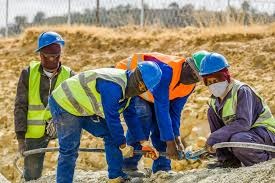With over 10 to 12 million young Africans entering the workforce annually, but only around 3 million formal jobs created each year in Africa, African countries are told to make job creation their priority.
“Unemployment, particularly among youth, is not merely an economic concern. It is a threat to peace, to social cohesion, and ultimately to the legitimacy of our development model. Without jobs, hope fades. Without hope, stability weakens. And without stability, development becomes impossible. By contrast, when we place jobs at the center of our policy agendas—when we make employment creation not a byproduct of growth but its primary driver—we pave the way for inclusive prosperity, political stability, and economic transformation,” said Mr. Antonio Pedro, UN Economic Commission for Africa’s (ECA) Deputy Executive Secretary (Program Support).
He made the remark on Monday addressing the African Leadership Forum opened in Kampala, Uganda on the Theme: ‘Realizing Sustainable Development Goals in Africa – Progress and the Way Forward’. Indicating that more than 76 million young people across the continent remain neither in employment, education nor training, he calls for a systemic response to address the problem.
“Governments must champion policies that expand access to education, infrastructure, digital connectivity, and clean energy—especially for underserved communities. The private sector must invest not only in profit but in purpose. And civil society must be empowered to hold all actors accountable for delivering real, measurable progress,” he said.
“This moment calls for a new social compact, one rooted in dignity, inclusion, and shared opportunity. We must ensure that women and youth—who are often sidelined—are placed at the heart of labor markets, enterprise development, and policy design. Empowering them is not charity—it is a necessity. Africa cannot achieve its ambitions by relying solely on the export of raw commodities. Structural transformation must be accelerated. We must shift from resource extraction to value addition, from fragmentation to integration, from vulnerability to resilience.”
“This is why the work underway between the Democratic Republic of the Congo and Zambia to establish a transboundary Special Economic Zone for electric vehicle batteries is so critical. It exemplifies how Africa can turn its mineral wealth—cobalt, lithium, manganese—into a source of regional industrialization and global competitiveness,” he said.
The 8th African Leadership Forum (ALF) is co-convened by the former President of Tanzania and ALF Patron, Jakaya Kikwete, and former Prime Minister of Ethiopia, Hailemariam Desalegn to mobilize action on pressing developmental challenges.
Mr. Antonio also indicated that through the African Continental Free Trade Area (AfCFTA), Africa has “an unprecedented opportunity to scale our industries, deepen value chains, and strengthen intra-African trade”.
“ECA analysis shows that reducing tariffs and non-tariff barriers within the AfCFTA could boost intra-African trade by 45% by 2045, especially in agro-processing and industrial goods. Yet integration must not remain an abstract aspiration. It must be operationalized—through investment in transport corridors, harmonization of standards, and the ratification of pending AfCFTA protocols, particularly on free movement, competition, and investment,” he said.
He also stressed for the need of centers of excellence in STEM, AI, and cybersecurity across sub-regions, building on emerging successes in countries like Kenya, Togo, and the Congo. “Emerging technologies—AI, quantum computing, robotics—offer Africa the chance to leapfrog outdated models of development. We must embrace these frontiers not as distant futures, but as urgent priorities. The global AI market alone is projected to reach $1.8 trillion by 2030, yet Africa currently holds just 1% of that market,” said Mr. Antonio Pedro.
The lack of productive and decent jobs remains the largest labor market challenge for young people in Sub-Saharan Africa, according to the latest report by the International Labor Organization. “At 21.9 per cent in 2023, the youth NEET (not in employment, education, or training) rate in sub-Saharan Africa exceeded the global rate (at 20.4 per cent). The region is one of only three global regions judged to be “off track” in its Sustainable Development Goals commitment (under target 8.6) to lower numbers of young NEETs.

